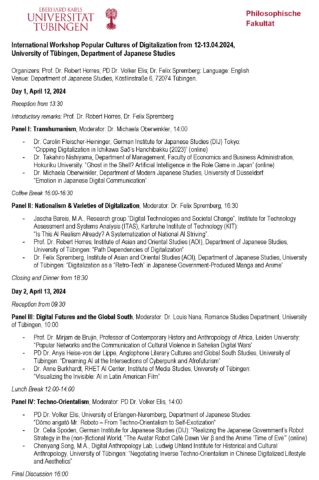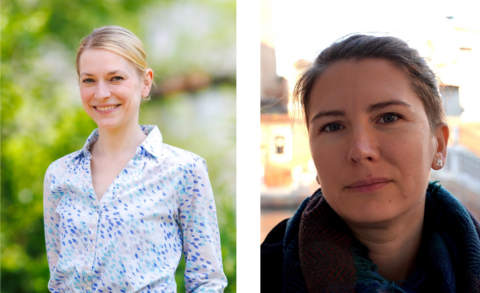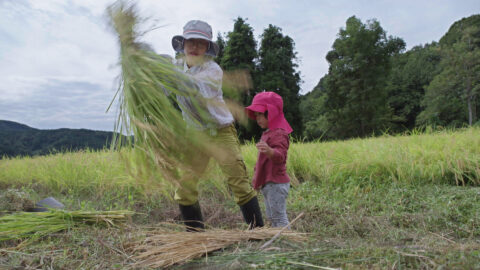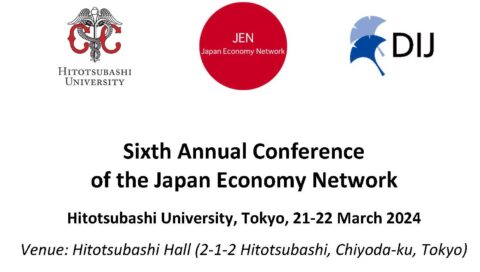イベント&アクティビティ
Online Study Group on Japanese housewives’ post-war anti-pollution movement

“Give us Our Blue Skies Back!” is the catchphrase under which nearly 7,000 women in Tobata (Kitakyushu) mobilised against emissions from local industries. Most of the activists were ordinary housewives with little formal education and without political experience. Yet, these housewives executed one of the earliest, longest, and most sophisticated anti-pollution movements in Japan’s postwar history, spanning from 1950 to 1969. Engaging in a new way of writing the history of environmental movements, this research shifts the focus from men to women, from highly educated elites to ordinary citizens, from Tokyoites to people in the Japanese periphery, and from the presumed heyday of environmental movements, the 1970s and 1980s, to the 1950s and 1960. It thereby contributes to a new understanding of the democratisation of Japan, gender roles in post-war society, the rise of ecological consciousness and the democratisation of science through ‘citizen scientists’. Details and registration here
DIJ researchers at ‘Popular Cultures of Digitalization’ workshop
 DIJ researchers Carolin Fleischer-Heininger and Celia Spoden will present their latest research results at the international workshop “Popular Cultures of Digitalization” on April 12 and 13. Carolin will present her paper “Cripping digitalization in Ichikawa Saō’s Hanchibakku (2023)” in the first panel on Transhumanism on Friday. On Saturday, Celia will give her paper “Realizing the Japanese Government’s Robot Strategy in the (non-)fictional World: The Avatar Robot Café Dawn Ver.β and the Anime ‘Time of Eve'” in the last panel on Techno-Orientalism. The workshop is organized by DIJ alumni Robert Horres, Volker Elis, and Felix Spremberg at the University of Tübingen’s Department of Japanese Studies.
DIJ researchers Carolin Fleischer-Heininger and Celia Spoden will present their latest research results at the international workshop “Popular Cultures of Digitalization” on April 12 and 13. Carolin will present her paper “Cripping digitalization in Ichikawa Saō’s Hanchibakku (2023)” in the first panel on Transhumanism on Friday. On Saturday, Celia will give her paper “Realizing the Japanese Government’s Robot Strategy in the (non-)fictional World: The Avatar Robot Café Dawn Ver.β and the Anime ‘Time of Eve'” in the last panel on Techno-Orientalism. The workshop is organized by DIJ alumni Robert Horres, Volker Elis, and Felix Spremberg at the University of Tübingen’s Department of Japanese Studies.
Hybrid Study Group on Japanese Environmental Attitudes

The role of institutional and governmental policies in combating climate change is crucial, yet their success hinges on public compliance and support. The willingness of people to modify their individual habits directly impacts the effectiveness of climate protection measures. Using survey data from the International Social Survey Programme Environment module for Japan between the years 1993 and 2020, this presentation discusses how the perception and reaction to environmental issues and climate change has evolved. The analysis centres on pro-environmental attitudes, willingness to make sacrifices to protect the environment, environmental self-efficacy, and beliefs in external solutions to the climate crisis. The presentation aims to shed light on the intricate relationship between individual attitudes, societal trends, and policy effectiveness in the context of climate change, ultimately providing insights that could guide future strategies for fostering a more environmentally sustainable society in Japan. Details and registration here
Hybrid Study Group on Political Economy of Green Industrial Policies in East Asia
 Green industrial policies are at the center of a distinct sustainability transformation process in East Asia, most notably in China, Japan, and South Korea. These East Asian late-capitalist economies differ in many ways but also share strong commonalities that distinguish them from Western capitalist types. The three countries are now taking a leading role in developing green technologies, industries, and exports. In fact, they have been able to occupy crucial parts of the global value chain in green industries and the international political economy of sustainability. This presentation investigates why the three East Asian countries succeeded in green technology leadership but lack behind in achieving other environmental goals. What are the distinct characteristics that distinguish them from Western market economies and what are the lessons that can be drawn for countries in the Global North and the Global South alike? Details and registration here
Green industrial policies are at the center of a distinct sustainability transformation process in East Asia, most notably in China, Japan, and South Korea. These East Asian late-capitalist economies differ in many ways but also share strong commonalities that distinguish them from Western capitalist types. The three countries are now taking a leading role in developing green technologies, industries, and exports. In fact, they have been able to occupy crucial parts of the global value chain in green industries and the international political economy of sustainability. This presentation investigates why the three East Asian countries succeeded in green technology leadership but lack behind in achieving other environmental goals. What are the distinct characteristics that distinguish them from Western market economies and what are the lessons that can be drawn for countries in the Global North and the Global South alike? Details and registration here
Film screening and discussion of patterns of moving to rural Japan

Japan’s regions have been challenged by demographic decline and an aging population for some decades. Despite or even because of these challenges, a small number of people from urban centres of the country decide to move to rural areas. This DIJ Forum (onsite only) combines two different perspectives on migration patterns from urban to rural Japan. Filmmaker Sonja Blaschke introduces her film “Reisfeld statt Tokio” (in German, with English subtitles; 30min), highlighting the story of a young urban woman and her new lifestyle in a small village in the mountains of rural Japan. Tomoo Matsuda then introduces cases of urban professionals who decide to live temporarily or permanently in Japan’s countryside. Challenging the traditional pattern of migration to the nation’s capital, he illustrates the concept of “gyaku-sankin kōtai”, exploring the merits of moving to rural areas. Details and registration here
Sonja Blaschke, freelance journalist
Tomoo Matsuda, Mitsubishi Research Institute
UPDATED European-Japanese dialogue on ‘How to deal with China’
 Please note that this event has changed to an online only format. Given China’s indisputable economic and geopolitical importance, China cannot be ignored, passed or de-coupled. It is at the same time a partner, a competitor as well as an ideological and potential military opponent in the evolving multipolar world order. When dealing with China, how should we balance these different relational aspects? How can we maintain a constructive exchange without jeopardizing our own interests? Through a dialogue between European and Japanese China experts, the conference How to deal with China will address these questions from different perspectives. Speakers include Hans van Ess (LMU Munich), Mats Lennart Harborn (Traton China Group), Shigeto Sonoda (University of Tokyo), Osamu Mogi (Kikkoman Corporation), and Junichiro Ikeda (Mitsui O.S.K. Lines). The conference is co-organised by the University of Tokyo’s Global Asian Studies, the Keizai Doyukai, and the DIJ. Details and registration here
Please note that this event has changed to an online only format. Given China’s indisputable economic and geopolitical importance, China cannot be ignored, passed or de-coupled. It is at the same time a partner, a competitor as well as an ideological and potential military opponent in the evolving multipolar world order. When dealing with China, how should we balance these different relational aspects? How can we maintain a constructive exchange without jeopardizing our own interests? Through a dialogue between European and Japanese China experts, the conference How to deal with China will address these questions from different perspectives. Speakers include Hans van Ess (LMU Munich), Mats Lennart Harborn (Traton China Group), Shigeto Sonoda (University of Tokyo), Osamu Mogi (Kikkoman Corporation), and Junichiro Ikeda (Mitsui O.S.K. Lines). The conference is co-organised by the University of Tokyo’s Global Asian Studies, the Keizai Doyukai, and the DIJ. Details and registration here
Hybrid Study Group on education at Japan’s National Defense Academy

After the physical and moral devastation brought by the defeat in the Asia-Pacific War, Japanese administrations in the Cold War era charted a course of gradual rearmament against the backdrop of substantial anti-militarist sentiments among the wider society. This tension placed members of the newly rebranded Self-Defense Forces (SDF) in an uneasy position. This research project examines the institutional socialisation of the SDF’s leadership through a one-year ethnography of Japan’s National Defense Academy (NDA), where the bulk of the future senior officers of the SDF’s three branches are educated. Through this anthropological inquiry, this presentation seeks to answer how history, tradition, and identity of the Japanese SDF are negotiated at the NDA. Details and registration here
DIJ co-organizes Annual Conference of the Japan Economy Network
 Together with Hitotsubashi University, the DIJ co-organizes this year’s Sixth Annual Conference of the Japan Economy Network (JEN) on March 21-22. The conference features thirty-six speakers in ten sessions, including a dinner keynote speech by Nobuko Nagase (Ochanomizu University), chaired by DIJ economist Markus Heckel. DIJ advisory board member David Chiavacci (University of Zurich) will give a presentation on “Transnationalism and foreign workers in Japan: Between state policies and market forces”. The full programme is available here (PDF).
Together with Hitotsubashi University, the DIJ co-organizes this year’s Sixth Annual Conference of the Japan Economy Network (JEN) on March 21-22. The conference features thirty-six speakers in ten sessions, including a dinner keynote speech by Nobuko Nagase (Ochanomizu University), chaired by DIJ economist Markus Heckel. DIJ advisory board member David Chiavacci (University of Zurich) will give a presentation on “Transnationalism and foreign workers in Japan: Between state policies and market forces”. The full programme is available here (PDF).

















 Open Access
Open Access
